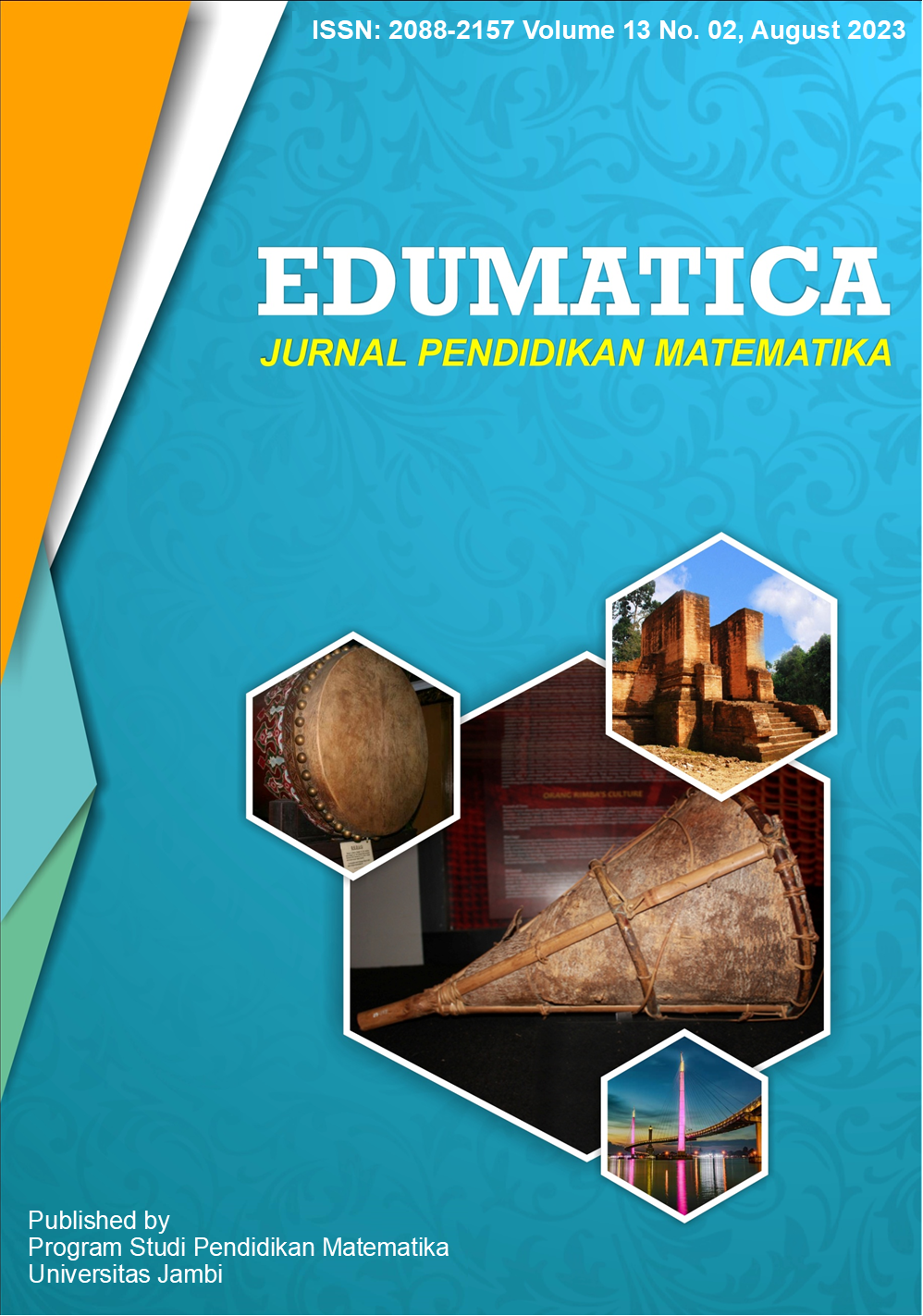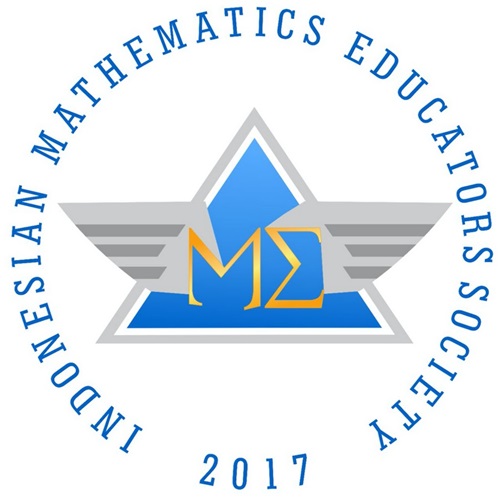Improving Students' Understanding of Mathematical Concepts Through the Flipped Classroom Learning Model for Class VIII SMP
DOI:
https://doi.org/10.22437/edumatica.v13i02.26445Keywords:
flipped classroom, understanding of mathematical conceptsAbstract
This study aimed to find out the difference between class VIII students of SMP Negeri 2 Bintan who used the Flipped Classroom learning model and conventional learning. This quantitative study uses a Quasy Experiment research type with a non-equivalent control group design. The sampling technique uses cluster sampling. The research instruments included interview sheets, observation sheets, and a description of 5 questions. The questions were then tested for validity, reliability test, difficulty level test, and discrimination test. The prerequisite tests carried out were the normality and homogeneity tests, and then the data results were normally distributed, and the two groups were homogeneous. The results showed that students in the experimental class obtained an average increase in their understanding of mathematical concepts by 0.35, while students in the control class obtained an increase of 0.21. Test the hypothesis using an independent t-test with a sig. (2-tailed) value of 0.000. Because this test is a right-hand side test, the p-value = × 0.000 = 0, and it is known that 0 ≤ 0.05, so  is accepted. It can be concluded from this study that the increased understanding of mathematical concepts of students who learn with the Flipped Classroom model is higher than students who learn with conventional learning. It can be concluded from this study that the increased understanding of mathematical concepts of students who learn with the Flipped Classroom model is higher than students who learn with conventional learning.
Downloads
References
Apriyanah, P., Nyeneng, I. D. P., & Suana, W. (2018). Efektivitas Model Flipped Classroom pada Pembelajaran Fisika Ditinjau dari Self Efficacy dan Penguasaan Konsep Siswa. JIPFRI (Jurnal Inovasi Pendidikan Fisika Dan Riset Ilmiah), 2(2), 65-74. https://doi.org/10.30599/jipfri.v2i2.302
Asti, M., Gunur, B., Jelatu, S., & Ramda, A. H. (2022). Students’ Understanding of Mathematical Concepts in terms of Emotional and Spatial Intelligence. Jurnal Pendidikan Dan Kebudayaan Missio, 14(1), 25-36. https://doi.org/10.36928/jpkm.v14i1.937
Fauzi, Y. N., Irawati, R., & Aeni, A. N. (2022). Model Pembelajaran Flipped Classroom dengan Media Video untuk Meningkatkan Pemahaman Konsep Matematis Siswa. Jurnal Cakrawala Pendas, 8(4), 1537-1549.
Fauziah, S. R., Rismen, S., & Lovia, L. (2022). Analisis Kemampuan Pemahaman Konsep Matematis Siswa di Era New Normal. Lattice Journal : Journal of Mathematics Education and Applied, 1(1), 45. https://doi.org/10.30983/lattice.v1i1.4744
Fikri, S. A. (2019). Flipped Classroom Terhadap Kemampuan Pemahaman Konsep. Sendika Jurnal, 5(1), 325-330.
Harmini, T., Sudibyo, N. A., & Suprihatiningsih, S. (2022). The Effect of the Flipped Classroom Learning Model on Students’ Learning Outcome in Multivariable Calculus Course. AlphaMath : Journal of Mathematics Education. https://doi.org/10.30595/alphamath.v8i1.10854
Hasibuan, E. K. (2018). Analisis Kesulitan Belajar Matematika Siswa Pada Pokok Bahasan Bangun Ruang Sisi Datar Di Smp Negeri 12 Bandung. AXIOM : Jurnal Pendidikan Dan Matematika, 7(1), 18-30. https://doi.org/10.30821/axiom.v7i1.1766
Herwandi, H., & Kaharuddin, A. (2020). Exploration of the Influence of Learning ELPSA (Experiences, Language, Pictures, Symbols, and Applications) on the Understanding of Mathematical Concepts. Indonesian Journal of Instructional Media and Model, 2(2). https://doi.org/10.32585/ijimm.v2i2.926
Ihda, R., & Harahap, T. H. (2022). The Effectiveness of the Flipped Classroom Learning Model to Improve Mathematics Learning Outcomes at MTS Amalul Ikhlas. EduMatika: Jurnal MIPA. https://doi.org/10.56495/emju.v2i4.264
Jafar, A. F. (2021). Penerapan Metode Pembelajaran Konvensional Terhadap Hasil Belajar Fisika Peserta Didik. Al Asma: Journal of Islamic Education, 3(2), 190-199.
Juniantari, M., Pujawan, I. G. N., & Widhiasih, I. D. A. G. (2019). Pengaruh Pendekatan Flipped Classroom Terhadap Pemahaman Konsep Matematika Siswa Sma. Journal of Education Technology, 2(4), 197. https://doi.org/10.23887/jet.v2i4.17855
Khairani, B. P., & Roza, Y. (2016). “Analisis Kemampuan Pemahaman Konsep Matematis Siswa Kelas XI SMA/MA pada Materi Barisan dan Deret.” Jurnal Cendekia : Jurnal Pendidikan Matematika, 05(02), 1578-1587.
Khairani, N., Tanjung, I. F., & Rohani. (2022). Improving Student Learning Outcomes Using the Flipped Classroom Learning Model. Islamic Journal of Integrated Science Education (IJISE). https://doi.org/10.30762/ijise.v1i3.358
Kristantini, R., Sumardi, H., & Zamzaili. (2022). Analisis kesulitan menyelesaikan soal pemecahan masalah materi bangun ruang sisi datar berbasis etnomatematika bengkulu selatan. SERPEN: Journal of Mathematics Education And Applied, 4(1), 34-45. https://doi.org/https://doi.org/10.36655/sepren.v4i1
Li, B., & Peng, M. (2022). Integration of an AI-Based Platform and Flipped Classroom Instructional Model. Scientific Programming. https://doi.org/10.1155/2022/2536382
Luritawaty, I. P. (2018). Pembelajaran Take and Give dalam Upaya Mengembangkan Kemampuan Pemahaman Konsep Matematis. Mosharafa: Jurnal Pendidikan Matematika, 7(2), 179-188. https://doi.org/10.31980/mosharafa.v7i2.27
Mayasari, D., & Habeahan, N. L. S. (2021). Analisis kemampuan pemahaman konsep siswa dalam menyelesaikan soal cerita matematika. AKSIOMA: Jurnal Program Studi Pendidikan Matematika, 10(1), 252-261. https://doi.org/https://doi.org/10.24127/ajpm.v10i1.3265
Milman, N. B. (2014). Distance Learning. Information Age Publishing.
Murnaka, N. P., & Dewi, S. R. (2018). Penerapan Metode Pembelajaran Guided Inquiry untuk Meningkatkan Kemampuan Pemahaman Konsep Matematis. Journal of Medives : Journal of Mathematics Education IKIP Veteran Semarang, 2(2), 163-171. https://doi.org/10.31331/medives.v2i2.637
Mutmainah, S., Setiawan, Y., & Purwanto. (2019). Model Pembelajaran Flipped Classroom.
Novianska, M., Romdanih, & Hasanah, N. (2021). Kemandirian Belajar Peserta Didik Pada Pembelajaran Matematika Dengan Metode Contextual Teaching and Learning ( CTL ) Secara Daring. SEMNARA, 385-397.
Pratidiana, D., Pujiastuti, H., & Santosa, C. A. (2022). Pengaruh Model Pembelajaran Flipped Classroom dan Gaya Kognitif Terhadap Kemampuan Pemecahan Masalah Matematis Siswa. MENDIDIK: Jurnal Kajian Pendidikan Dan Pengajaran. https://doi.org/10.30653/003.202282.233
Radiusman. (2020). Studi literasi: pemahaman konsep siswa pada pembelajaran matematika. FIBONACCI: Jurnal Pendidikan Matematika Dan Matematika, 6(1), 1-8. https://doi.org/https://dx.doi.org/10.24853/fbc.6.1.1-8 2013:58)
Riajanto, M. L. E. J. (2020). Pengaruh Sikap Terhadap Kemampuan Pemahaman Geometris SIswa Kelas VII Melalui Realistic Mathematic Education Berbantuan Software Geometer’s Skethpad. Jurnal Pembelajaran Matematika Inovatif, 3(2), 153-166. https://doi.org/10.22460/jpmi.v1i3.153-166
Rohmatulloh, R., Syamsuri, S., Nindiasari, H., & Fatah, A. (2022). Analisis Meta: Pengaruh Model Pembelajaran Problem Based Learning (PBL) Terhadap Kemampuan Penalaran Matematis Siswa. Jurnal Cendekia : Jurnal Pendidikan Matematika, 6(2). https://doi.org/10.31004/cendekia.v6i2.1395
Sari, J., & Hayati, F. (2019). Analisis Kemampuan Pemahaman Konsep Matematis Siswa SMP pada Materi Bangun Datar Segiempat. Pi: Mathematics Education Journal, 2(1), 14-25. https://doi.org/10.21067/pmej.v2i1.2838
Siregar, N. R. (2017). Persepsi siswa pada pelajaran matematika: studi pendahuluan pada siswa yang menyenangi game. Prosiding Temu Ilmiah X Ikatan Psikologi Perkembangan Indonesia, 224-232. Yogyakarta.
Solahudin, I. (2019). Pengaruh Model Pembelajaran Dan Kemandirian Belajar Terhadap Pemahaman Konsep Matematika. METATIKA: Jurnal Pendidikan Matematika, 1(2), 12-24.
Stanislaus, S. U. (2009). Pedoman analisis data dengan SPSS (Edisi Keti). Yogyakarta: Graha Ilmu.
Sugiyono. (2016). Metode Penelitian Kuantitatif Dan Kualitatif dan R&D. Alfabeta.
Sukma, L. H., Ramadoni, R., & Suryani, M. (2022). The Implementation Effect of Peer Teaching Flipped Classroom on Student’s Understanding Of Mathematical Concepts in Learning Mathematics. Alifmatika: Jurnal Pendidikan Dan Pembelajaran Matematika, 4(2). https://doi.org/10.35316/alifmatika.2022.v4i2.150-165
Syahbana, A. (2013). Alternatif Pemahaman Konsep Umum Volume Suatu Bangun Ruang. Program Studi Pendidikan Matematika: Universitas PGRI Palembang, 03(02), 1-7.
Tamara, A., Maizora, S., & Hanifah, H. (2020). Application of Cooperative Learning to Improve the Understanding of Mathematical Concepts in Junior High School. Bencoolen Journal of Science Education and Technology, 1(2). https://doi.org/10.33369/bjset.1.2.38-46
Wahyudi, D., & Amir MZ, Z. (2022). Development of video learning media assisted by Sparkol Videoscribe to facilitate the ability to understand mathematical concepts of students. International Journal of Trends in Mathematics Education Research, 5(3), 306-314. https://doi.org/10.33122/ijtmer.v5i3.165
Walidah, Z., Wijayanti, R., & Affaf, M. (2020). Pengaruh Model Pembelajaran Flipped Classroom ( FC ) terhadap Hasil Belajar. Edumatica: Jurnal Pendidikan Matematika, 10(2), 71-77. https://doi.org/https://doi.org/10.22437/edumatica.v10i2.10546
Wardhani, R. M. K. P., Handoyo, B., & Budijanto, B. (2022). Pengaruh model flipped classroom berwahana Edmodo terhadap pemahaman konsep Geografi. Jurnal Integrasi Dan Harmoni Inovatif Ilmu-Ilmu Sosial (JIHI3S), 2(2), 116-127. https://doi.org/10.17977/um063v2i2p116-127
Downloads
Published
How to Cite
Issue
Section
License
Copyright (c) 2023 Nurul Wahyuni, Nur Izzati, Metta Liana

This work is licensed under a Creative Commons Attribution-NonCommercial-ShareAlike 4.0 International License.







